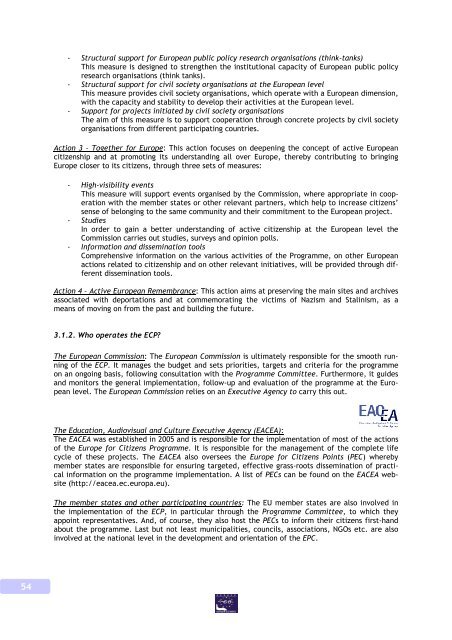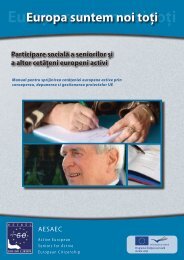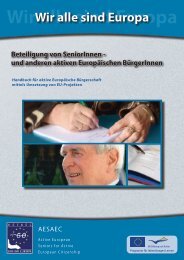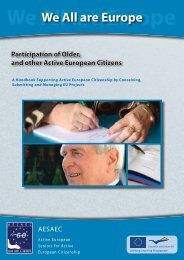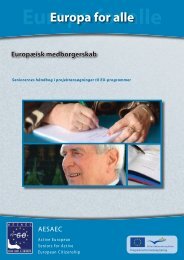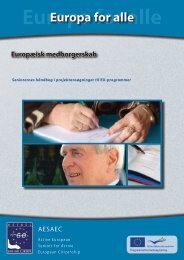We All are Europe - AESAEC
We All are Europe - AESAEC
We All are Europe - AESAEC
You also want an ePaper? Increase the reach of your titles
YUMPU automatically turns print PDFs into web optimized ePapers that Google loves.
- Structural support for <strong>Europe</strong>an public policy research organisations (think-tanks)<br />
This measure is designed to strengthen the institutional capacity of <strong>Europe</strong>an public policy<br />
research organisations (think tanks).<br />
- Structural support for civil society organisations at the <strong>Europe</strong>an level<br />
This measure provides civil society organisations, which operate with a <strong>Europe</strong>an dimension,<br />
with the capacity and stability to develop their activities at the <strong>Europe</strong>an level.<br />
- Support for projects initiated by civil society organisations<br />
The aim of this measure is to support cooperation through concrete projects by civil society<br />
organisations from different participating countries.<br />
Action 3 – Together for <strong>Europe</strong>: This action focuses on deepening the concept of active <strong>Europe</strong>an<br />
citizenship and at promoting its understanding all over <strong>Europe</strong>, thereby contributing to bringing<br />
<strong>Europe</strong> closer to its citizens, through three sets of measures:<br />
- High-visibility events<br />
This measure will support events organised by the Commission, where appropriate in cooperation<br />
with the member states or other relevant partners, which help to increase citizens’<br />
sense of belonging to the same community and their commitment to the <strong>Europe</strong>an project.<br />
- Studies<br />
In order to gain a better understanding of active citizenship at the <strong>Europe</strong>an level the<br />
Commission carries out studies, surveys and opinion polls.<br />
- Information and dissemination tools<br />
Comprehensive information on the various activities of the Programme, on other <strong>Europe</strong>an<br />
actions related to citizenship and on other relevant initiatives, will be provided through different<br />
dissemination tools.<br />
Action 4 – Active <strong>Europe</strong>an Remembrance: This action aims at preserving the main sites and archives<br />
associated with deportations and at commemorating the victims of Nazism and Stalinism, as a<br />
means of moving on from the past and building the future.<br />
3.1.2. Who operates the ECP<br />
The <strong>Europe</strong>an Commission: The <strong>Europe</strong>an Commission is ultimately responsible for the smooth running<br />
of the ECP. It manages the budget and sets priorities, targets and criteria for the programme<br />
on an ongoing basis, following consultation with the Programme Committee. Furthermore, it guides<br />
and monitors the general implementation, follow-up and evaluation of the programme at the <strong>Europe</strong>an<br />
level. The <strong>Europe</strong>an Commission relies on an Executive Agency to carry this out.<br />
The Education, Audiovisual and Culture Executive Agency (EACEA):<br />
The EACEA was established in 2005 and is responsible for the implementation of most of the actions<br />
of the <strong>Europe</strong> for Citizens Programme. It is responsible for the management of the complete life<br />
cycle of these projects. The EACEA also oversees the <strong>Europe</strong> for Citizens Points (PEC) whereby<br />
member states <strong>are</strong> responsible for ensuring targeted, effective grass-roots dissemination of practical<br />
information on the programme implementation. A list of PECs can be found on the EACEA website<br />
(http://eacea.ec.europa.eu).<br />
The member states and other participating countries: The EU member states <strong>are</strong> also involved in<br />
the implementation of the ECP, in particular through the Programme Committee, to which they<br />
appoint representatives. And, of course, they also host the PECs to inform their citizens first-hand<br />
about the programme. Last but not least municipalities, councils, associations, NGOs etc. <strong>are</strong> also<br />
involved at the national level in the development and orientation of the EPC.<br />
54


